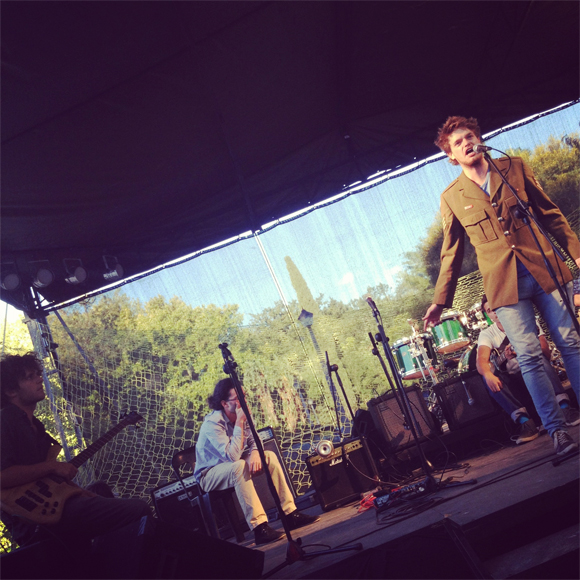Transkripsie. Pieter Odendaal and Bateleur, US Woordfees, 5 March 2012, Stellenbosch
KATE ELLIS-COLE
Tables at De Vette Mossel, decked in their customary blue-and-white, buzz with the sounds of relaxed conversation as patrons filter into the Woordfees venue and calmly take their seats here and there, stippling themselves into the formation of an audience. The hum is presently arrested by the booming voice of the well-loved Adrian Different, in his Afrikaans guise tonight as “Adriaan Verskillend”. In a short but adulatory introduction, Adrian succeeds in invoking excitement in the crowd, heralding our entertainer for the evening as “one of the best poets in South Africa”.
It is then that the esteemed Pieter Odendaal accepts his place on the stage amongst the band and their instruments. His frame lanky and angular, he fits directly into the aesthetic of the gallimaufry surrounding him. The evening is then graced and challenged in the modulations of Odendaal’s voice, woven whimsically with the talents of Bateleur, his Cape Town-based accompaniment.
The show is opened with an incredibly rhythmic and poignant piece that was inspired by the coelacanth. The phonetics of spoken words and the music work together to paint a vivid and animated scene of a world unknown and mysterious, as syllables become beats and beats become a tide that sweeps the imagination out into deeper waters to swim in the rises and falls of sound and imagery. Odendaal changes tack in his second piece, electing to don an artefact of the Border War as his costume for the next piece, retaining this attire for the next poem, too. Perhaps it is the inclusion of overtly political garb, but in his emotive description of bureaucracy and his protestations against it, Odendaal might be seen to be conveying an obsequious nostalgia for an older South Africa. But this vein is cauterized by Odendaal, however, who goes on to express his free-spirited views, despite his strong roots in Afrikaner heritage, by shrugging off the officer’s jacket and saying: “I feel uncomfortable wearing this. It’s also quite warm.”

Photo: Bibi Slippers/Litnet. More photos here.
In a beautifully designed move, Odendaal’s next piece is his “attempt at hip-hop”. A wonderful, groovy take on street culture, Odendaal uses the phoneticism and rhythm of Afrikaans to knit together a rap-like poem that has heads bobbing, and some members of his audience whistling their appreciation. The steel-drum brought in by the band for this particular piece affords it a modern-Calypso sound, all the more pushing the boundaries of identity and social binaries.
The crowd thoroughly warmed up, Odendaal invites fellow poet Annel Pieterse to join him onstage for the reading of their jointly translated poems. Powerful and playful all at once, the dual reading of the significant South African poems makes the audience collectively lean forward to attend as best they can to every word uttered by the pair. The readings are breathless, brilliant and offer a new insight into old favourites.
In other voices performed in the evening, Odendaal visits and re-visits older, famous poets, including Antjie Krog and Breyten Breytenbach. He also invites the voices of common men, at one stage depicting a cacophony of South African voices – raised in argument at times, and whispering apology at others. Odendaal uses this pastiche to rework the words of the world he embodies to in turn embody the world he wishes to portray. Surely a daunting task for any young poet, Odendaal hungrily reshapes the word with his writing and his voice, feeding on their inspiration and achievement, serving his interpretations to the audience with humility and comfortable aplomb.
Bateleur’s melodic but edgy indie sound is the perfect companion and vehicle for this journey. A quirky, fresh and dreamlike combination of strings, keyboard, synthesizer and sound recordings, Bateleur produce the kind of music that haunts, delights and elicits gooseflesh.
Despite being on an illusory journey, the evening seems to avail itself to the storytelling on stage, as the setting sun throws spangled golden rays across the performers, and the wind joins heartily with the music in pieces that are immersed in nature. All of this activity, building climactically to crescendo with voice, music and atmosphere melting into a resonating experience for all in attendance.
The deeper commentaries of the evening’s performances are what cause it to linger with the listener, which further entrenches the role of art and performance, especially in its new and emergent forms, as a catalyst for change and revolution. Its function as a reflector in order to elucidate our selves and our collective histories is also not ignored in Odendaal’s performance. He does not hesitate to divulge himself, his emotions, and conversationally and modestly invites the audience to join him in imaginative and creative conversation. He similarly exhibits no perturbation in addressing the political, although he does apologize for utterances that to some may appear politically incorrect. The performance is affecting and important, all the while being intimate and discursive, never slipping into condescension or self-absorption.
 SLiPStellenbosch Literary Project
SLiPStellenbosch Literary Project